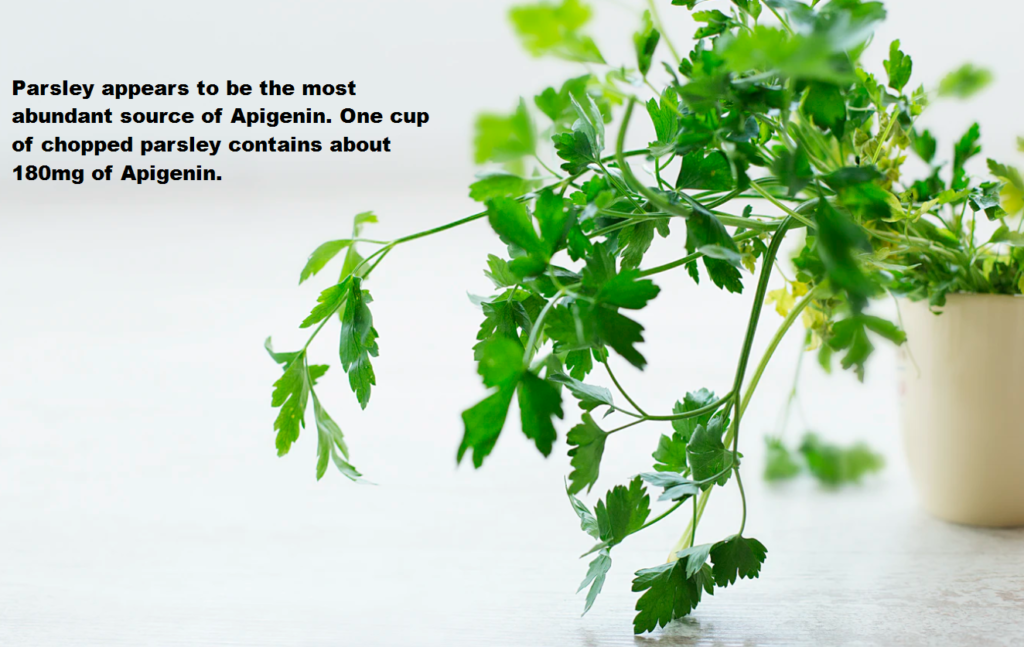When it comes to fitness and health compounds, we all know that most are overhyped and ineffective.
Dozens upon dozens of compounds have come and gone over the years, and we’ve slowly (but surely) become more skeptical with each passing product on the market.
And who could blame us? It’s not like we haven’t given them a chance – they just don’t work.
A handful of compounds over the years have proven themselves to be effective, and it looks like apigenin might just make the list, too.
Today, we’ll go over everything you need to know about apigenin, what it is, how it impacts our hormones, and how it might benefit our bodybuilding efforts.
Ready? Let’s dive in.
What Is Apigenin, Exactly?
Apigenin is a flavonoid that is commonly found in plants – primarily fruits and vegetables and is typically used to dye wool.
But, preliminary research on apigenin suggests that the compound could be used for a lot more than dyeing, as it appears to have a broad spectrum of effects and potential benefits for us.
More specifically, even small doses of apigenin can deliver a whole host of health and fitness benefits. Let’s take a more in-depth look.
Apigenin’s Effects On Testosterone Levels
We all know that testosterone is among the most important male hormones and is responsible for all kinds of things, including:
- Muscle growth and strength;
- Fat loss;
- Confidence and reduction in anxiety;
- Prevention of depression;
- Energy levels;
- Libido
Just to name a few.
The exciting thing is, it appears that apigenin supplementation could favorably impact our testosterone levels, which itself could help us stay healthy and make better fitness progress.
One study from 2011 looked at the effects of apigenin on testosterone biosynthesis through various mechanisms, especially as it relates to aging men (1). Researchers looked at multiple processes involved in steroidogenesis. They found that apigenin supplementation could lead to an increase in testosterone. In their words:
It also suggests the potential for a dietary approach for the enhancement of steroidogenesis in aging Leydig cells.
While we need more research before making any definitive statements, this one study put apigenin on the map and showed us that it might have a lot of promise in that regard.
Apigenin’s Effects On Estrogen
One interesting study from over a decade ago looked at apigenin’s effects on breast cancer cell growth (2). What’s more, researchers looked at apigenin’s effects on estrogen and its possible effects as an antiestrogen (estrogen blocker) (3).
They found that apigenin can work both as estrogen as well as an antiestrogen through various mechanisms. Regarding its effects on breast cancer cell growth, researchers stated:
1) Collectively, these results show that apigenin can function as both an antiestrogen and a protein kinase inhibitor with activity against breast cancer cells.
2) We conclude that apigenin, through its ability to target both ERalpha-dependent and ERalpha-independent pathways, holds promise as a new therapeutic agent against antiestrogen-resistant breast cancer.
So far, research on apigenin’s effects on estrogen is quite sparse, so we should wait until we have more human trials.
Apigenin and Cortisol Levels: Is There a Correlation?
A study from the distant 2002 looked at the effects of various flavonoid phytochemicals (including apigenin) on cortisol production (4).
Researchers found that in isolated human H295R adrenal cells, exposure to 12.5 microM of apigenin decreased cortisol to 47.5 percent of control, and was only outperformed by 6-hydroxy flavone and 4′-hydroxy flavone.
So far, this study gives us valuable insight into the potential effects of apigenin on cortisol production and the potential health benefits that could bring in the long-run.
But, we need human in vivo trials before concluding.
Below is a picture of me. I have used, and had good results with, Apigenin in the past. Not saying it’s all you need, but I did have a good experience with it. It is one of the main ingredients in a supplement called A-Bolic 4. If you would like to read my log and review of the product, Click this link.

Apigenin For Muscle Growth: Does It Show Any Promise?
Okay, this is where things begin to gain some momentum, as we’ve got a couple of papers to look at.
First, we need to look at sarcopenia – the age-related muscle loss we experience over the decades. One of the primary reasons why sarcopenia occurs is because of the decline in testosterone levels as we get older (5, 6).
The first study we looked at above suggested that apigenin might have favorable effects on testosterone levels, especially as we age (1). This gives us essential insight into the compound and could mean that apigenin might be a viable option for treating and preventing sarcopenia.
The primary reason for this line of thinking is the fact that testosterone is essential for muscular strength and size. One prominent paper showed us that testosterone levels and lean muscle mass are tightly correlated (7). In their words:
We conclude that changes in circulating testosterone concentrations, induced by GnRH agonist and testosterone administration, are associated with testosterone dose- and concentration-dependent changes in fat-free mass, muscle size, strength and power, fat mass, hemoglobin, HDL cholesterol, and IGF-I levels, in conformity with a single linear dose-response relationship.
Numerous other studies have found a strong correlation between testosterone levels and muscle growth (8, 9, 10, 11).
What’s more, apigenin might have a direct effect on skeletal muscle hypertrophy and myoblast differentiation through regulation of the Prmt7 protein (12).
All in all, apigenin is showing some true potential when it comes to testosterone optimization and muscle growth, and we’re quite interested to see how future research will turn out.
Who knows, we might be dealing with quite the anabolic agent without even knowing it.
Can We Get Enough Apigenin From Our Diets? What Foods Contain The Compound?
As we covered above, apigenin is a flavonoid that is commonly found in plants. So, naturally, you’re probably asking yourself:
Well, can I get enough of the compound from my diet? What foods contain apigenin?
The richest sources of apigenin are fruits such as grapefruit and orange, as well as vegetables such as onions, celery, red pepper, parsley, chamomile, and wheat sprouts. Apigenin can also be found in some plant-derived beverages such as tea (13). Researchers in this study also suggest:
Since apigenin is one of the most bioactive plant flavone and is widely distributed in common fruits, beverages and vegetables, its consumption through diet is highly recommended. Based on the studies provided apigenin affects several critical pathways and/or targets which are associated with several health disorders including cancer.
So, a great starting point is to begin including more apigenin-rich foods in our diets. That alone should help bring about numerous health benefits in the short- and long-term.

Apigenin and Brain Health
Some exciting research suggests that apigenin might be incredibly beneficial for brain health, as it appears to increase brain connections (14).
Some previous research on animals has shown that compounds similar to apigenin (flavonoids) positively affected brain function, memory, and learning.
The positive effects flavonoids have on brain function have been known for a while, and researchers suggest that they might preserve brain function as we age.
The study in question is from 2015 and comes from researchers of the Federal University of Rio de Janeiro (UFRJ), D’Or Institute for Research and Education (IDOR), and Federal University of Bahia (UFBA) (15).
Apigenin appears to bind to estrogen receptors, which play essential roles in the growth and development of the nervous system. Here’s a quote from the paper:
This observation suggests that API could be used as a tool for neural differentiation, to accelerate neuronal maturation and synaptogenesis, and to make more robust in vitro models. These results endorse that API is not only a potent neurogenic agent but also a strong synaptogenic driver.
In the experiment, researchers applied apigenin on human stem cells in vitro. They found that these cells had turned to neurons within less than four weeks – an effect that would otherwise not occur without the aid of apigenin. What’s more, these neurons managed to create strong connections among themselves thanks to apigenin.
Apigenin and Sleep – Where Do We Stand On That?
It seems that apigenin is a mild sedative, and research suggests that it may improve sleep quality. In one paper, researchers found that apigenin supplementation improved sleep quality and increased sleep length in mice (16).
This has some merit because apigenin is the active ingredient in chamomile – a type of tea people often drink to relax and wind down (17). Researchers suggest that one possible mechanism here is apigenin’s modulation of GABA receptors – a common mechanism of many hypnotics (17).
With that said, we only have two papers to support the notion that apigenin improves our sleep, so we should wait for more research before swapping our melatonin pills with apigenin.

Apigenin Dosage – What Does Research Suggest?
In some trials, doses of 20 to 40 mg of apigenin have been shown to deliver benefits. In the real world, a cup of chopped parsley has about 180 mg of apigenin.
So, a single tablespoon should have about 10 mg of the compound. Meaning, you would have to consume two to four tablespoons of fresh parsley every day to reap benefits.
The good news is, dried parsley appears to be the most abundant source of apigenin out there, as roughly seven percent of it is apigenin.
For every 100 grams of dried parsley, you can expect to get about 13 grams of apigenin. Meaning, a single tablespoon (15 grams) of dried parsley should net you plenty of apigenin.
Further reading: Apigenin is one of the main ingredients in a bodybuilding supplement called A-Bolic 4 from The Lab. I recently used the supplement for 2 months. I logged my experience and wrote a review. If you would like to check it out, click this link.
If you would like to try Apigenin for yourself, click this link to check out A-Bolic 4 on Amazon.
After that, go Pump Some Iron!
Follow me / Pump Some Iron on Instagram for updates @pump.some.iron


